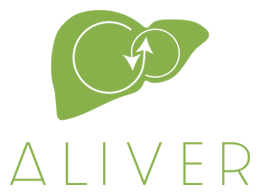At the 2017 International Liver Congress™ in Amsterdam, The Netherlands, the European Association for the Study of the Liver (EASL) announced the EU funded project ALIVER. The €7.8 million project is funded by the EU Horizon 2020 research programme. Work started on ALIVER on 1 January 2017 and will end on 30 September 2020.
Background
Each year over 170,000 people die from liver cirrhosis in Europe. There are over 1 million deaths globally. 29 million EU citizens and 650 million people globally suffer from a chronic liver disease. The economic burden of liver disease in Europe has been estimated at over €15.8 billion per annum.
The causes of liver disease are complex, but current rates of obesity and other lifestyle factors will lead to increasing rates of liver failure in coming years. The only treatment that will ensure long-term survival and quality of life is a liver transplant. Despite efforts made across Europe to increase organ donation, the number of patients requiring a liver transplant is increasing and supply is not keeping up with demand. There are currently over 1,500 patients on the Eurotransplant waiting list for a new liver, and many more in other countries of the EU who are not members of the Eurotransplant network.
The response
The ALIVER Consortium has developed a novel and innovative liver dialysis machine that will help the liver to naturally regenerate or, where that does not prove possible, to keep patients alive and healthy until a donated liver becomes available. DIALIVE has been demonstrated to be effective in pre-clinical tests.
How is DIALIVE different?
DIALIVE removes dysfunctional albumin and endotoxins, infuses fresh, functional albumin and specifically targets systemic inflammation using commercially available CE-marked filters in one unit. Existing liver dialysis machines do not restore albumin function, have only a limited effect on systemic inflammation and do not improve survival rates.
What happens next?
The DIALIVE machine will be tested in clinical settings in the UK, Germany, France and Spain over the course of the project. The ALIVER Consortium believes that DIALIVE will:
- Significantly improve the prognosis of patients with liver failure by targeting systemic inflammation
- Reduce mortality rates for patients admitted to hospital with liver failure
- Allow patients in intensive care to return home with fewer readmissions to hospital
- In those that don’t recover, provide a bridge to transplantation
About the Consortium
Two universities, four hospitals, two foundations and four industrial partners will work together to deliver DIALIVE. The consortium members are:
- University College London
- Yaqrit Limited
- Fakkel BVBA
- European Foundation for the study of chronic liver failure
- Albutec GMBH
- European Association for the Study of the Liver
- Assistance Publique, Hopitaux de Paris
- Service Madrileno de Salud
- Universitätsmedizin Rostock
- IBM Ireland
- Royal Free Hospital, Royal Free Hampstead NHS Trust, London
Commenting ahead of the ALIVER meeting that took place at the ILC 2017, Principle Investigator for the Project, Professor Rajiv Jalan, said, “We are delighted to be launching ALIVER here in Amsterdam with EASL. The project brings together scientific excellence in liver disease, clinical practice, and industrial partnership, with EU funding. This is the future of medicine and health research and there is no better place to launch ALIVER than here at the EASL ILC.”
“Patients with severe liver disease don’t have good treatment options today. The DIALIVE technology is the first breakthrough for many years designed to fill that gap in patient care,” said Daniel Green, CEO of Yaqrit Ltd, an industrial member of the ALIVER consortium.





